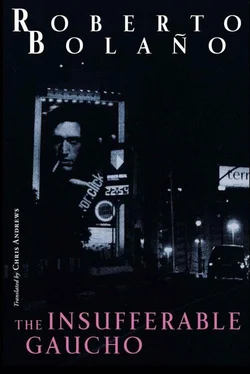Two days later, in spite of the lawyer’s entreaties, she took the train back to Buenos Aires. When I’m away from Buenos Aires I feel like another person, she explained to him as they waited on the platform, just the two of them. And I’m too old to become someone else. Women, they’re all the same, thought Pereda. Everything is changing, the cook explained to him. The city was full of beggars, and respectable people were organizing neighborhood soup kitchens just to have something to put in their stomachs. There must have been ten different kinds of currency, not counting the official money. No one was bored. People were desperate, but not bored. As she spoke, Pereda was watching the rabbits that had appeared on the other side of the tracks. The rabbits looked at them, then bounded away across the plain. Sometimes it’s as if the country round here were crawling with lice or fleas, thought the lawyer. With the money the cook had brought, he paid his debts and hired a pair of gauchos to repair the roof of the ranch house, which was falling in. The problem was that he knew next to nothing about carpentry, and the gauchos knew even less.
One was called José and must have been around seventy. He didn’t have a horse. The other was called Campodónico and was probably younger, though maybe not. Both wore the traditional baggy bombachas , but their headgear consisted of caps they had made themselves from rabbit skins. Neither had a family, so after a while they both came to live at Alamo Negro. At night, by the light of a fire out in the open, Pereda whiled away the time recounting adventures that had taken place exclusively in his imagination. He spoke to them of Argentina, Buenos Aires, and the pampas, and he asked them which one of the three they would choose. Argentina’s like a novel, he said, a lie, or make-believe at best. Buenos Aires is full of crooks and loudmouths, a hellish place, with nothing to recommend it except the women, and some of the writers, but only a few. Ah, but the pampas — the pampas are eternal. A limitless cemetery, that’s what they’re like. Can you imagine that, boys, a limitless cemetery? The gauchos smiled and confessed that it was pretty hard to imagine something like that, since cemeteries are for humans, and although the number of humans is big, there’s a limit to it. Ah, but the cemetery I’m talking about, said Pereda, is an exact copy of eternity.
With the money he had left, he went to Coronel Gutiérrez and bought himself a mare and a colt. The mare would let itself be ridden, but the colt was not much use for anything and had to be treated with extreme caution. Sometimes, in the evening, when he was sick of working or sitting around, Pereda went into Capitán Jourdan with his gauchos. He rode José Bianco; the gauchos rode the mare. When he entered the store a respectful hush would fall over the clients, some playing cards, others playing draughts. When the mayor, who was prone to depression, turned up, there would always be four brave volunteers for a game of Monopoly that lasted until dawn. The habit of playing games (not to speak of Monopoly) seemed ill bred and dishonorable to Pereda. A store is a place where people converse or listen in silence to the conversations of others, he thought. A store is like an empty classroom. A store is a smoky church.
Some nights, especially when gauchos from out of town or some disoriented traveling salesman turned up, Pereda felt a powerful desire to start a fight. Nothing serious, just a scrap, but with real knives, not chalked sticks. Other nights he would fall asleep between his two gauchos and dream that his wife was leading their children by the hand and scolding him for the way he had let himself lapse into brutishness. And what about the rest of the country? replied the lawyer. But that’s no excuse, che , rejoined Mrs. Pereda, née Hirschman. At which point the lawyer was obliged to agree, with tears welling up in his eyes.
In general, however, his dreams were peaceful, and when he woke up in the morning he was in good spirits and keen to start work. Although, to tell the truth, not a lot of work was done at Alamo Negro. The repairing of the ranch house roof was a disaster. In order to start a kitchen garden, the lawyer and Campodónico bought seeds in Coronel Guttiérez, but the earth, it seemed, would accept no foreign seed. For a time, the lawyer tried to get the colt, which he called “my stud horse,” to cover the mare. If the mare had a filly, all the better. That way, he imagined, he could soon build up a breeding stock that would lead the recovery; but the colt didn’t seem to be interested in covering the mare, and although he searched for miles around, Pereda couldn’t find a sire, since the gauchos had sold their horses to the slaughterhouse, and now got around on foot, or on bicycles, or hitched rides on the endless dirt tracks of the pampas.
We have fallen, we’re down, Pereda would say to his audience, but we can still pick ourselves up and go to our deaths like men. He too had to set rabbit traps to survive. In the evenings, when he left the house with his men, he would often let José and Campodónico empty the traps, along with a new recruit known as The Old Guy, while he set off alone for the ruined village. There he found some young people, younger than his gauchos, but so nervous and disinclined to converse that it wasn’t even worth inviting them for a meal. The wire fences were still standing in some places. Occasionally he would go to the railway line and stay there a long time, without dismounting, he and José Bianco both chewing grass stalks, waiting for the train to pass. And often it didn’t, as if that part of Argentina had been erased from memory as well as from the map.
One afternoon, as he was vainly attempting to get his colt to mount the mare, he saw a car driving over the plain, coming directly toward Alamo Negro. The car pulled up in the yard and four men got out. At first he didn’t recognize his son. Nor did Bebe realize that the old guy in bombachas with a beard, long tangled hair, and a bare chest tanned by the sun was his father. Son of my soul, said Pereda, hugging him, blood of my blood, vindication of my days, and he could have gone on like that if Bebe hadn’t stopped him to introduce his friends, two writers from Buenos Aires and the publisher Ibarrola, who loved books and nature, and had financed the trip. In honor of his son’s guests, that night the lawyer had a big bonfire built in the yard and sent for the foremost of Capitán Jourdan’s guitar-strumming gauchos, warning him beforehand that he was to do strictly that: strum, without playing any song in particular, in accordance with the country way.
Campodónico and José were dispatched to fetch ten liters of wine and a liter of eau-de-vie, which they brought back from Capitán Jourdan in the mayor’s van. A good supply of rabbits was laid in, and one was roasted for each person present, although the the meat didn’t seem to find much favor with the visitors from the city. That night there were more than thirty people gathered around the fire, besides Pereda’s gauchos and his guests from Buenos Aires. Before the party began, Pereda announced that he didn’t want any fighting or unruly behavior, which was quite unnecessary, since the locals were peace-loving people who had to steel themselves to kill rabbits. All the same, the lawyer considered setting aside one of the multitudinous rooms so that people could lay down their knives, large and small, before taking part in the festivities, but on reflection he decided that such a measure really would be a little excessive.
By three in the morning the elders had set off back to Capitán Jourdan, and there were just a few young men left at the ranch, wondering what to do, since the food and drink had run out, and the guys from the city had already turned in. The next morning Bebe tried to convince his father to return to Buenos Aires with him. Things are gradually settling down, he said; personally he was doing all right. He gave his father a book, one of the many gifts he had brought, and told him that it had been published in Spain. Now I’m known throughout Latin America, he explained. But the lawyer had no idea what his son was talking about. He asked if he was married yet, and when Bebe said no, suggested he find himself an Indian woman and come to live at Alamo Negro.
Читать дальше












